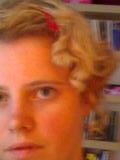Next year I plan to do an MA, hopefully followed by a PhD at the Institute of Contemporary History in London. I'm going to try and prepare for it whilst I'm going through my fertility and cancer treatment.
To help both of us, Phil has got a brilliant book from the library - 'How to write a thesis' by Jenny Murray. To be a good writer you're supposed to write, whatever you want - 'freewriting' every day. The blog is excellent practice for this. I've had lots of ideas over the years, not all of which I want people to nick from this blog. But one, which I'm the only person who seems to be enthusiastic about, which is why I don't ming putting it up here, is 'A History of Love'. Here's Murray's 8 point step to start writing up your thesis:
A History of Love
1) Who are the intended readers?
Feminists, Young men, Historians, Philosophers
2) What did you do?
Read a lot of books and thought that Love hadn't been analysed from a social science or positive feminist perspective. When Greer wrote about Love she was dismissive. Marx and Engels didn't really mention it. The greeks broke it down into different types.
3) Why did you do it?
Because Love had had such a positive impact on my own life so I thought it was strange that social scientists had not analysed this before. I had a theory that Love is a form of secular idealism, which in philosophical terms, as it is mainly women who are the main players, has not been studied. 'Care' has been studied more, as one could argue that provision of health and social care services is the study of 'Care.' I asked people what the difference is between Care and Love.
4) What happened?
I got a diverse range of answers when I asked people what the difference between Care and Love is - Greed, money, quantification, passion, energy. Nobody seemed to understand what I was on about, which I'm still trying to come to terms with and get my ideas understandable.
5) What do the results mean in theory?
That Love is secular idealism, with little recorded to support this until my research, because it is a female domain.
6) What do the results mean in practice?
I hope that the results enable Love to be seen as a philosophy in itself, something that can be made and in its creation, change the world for the better.
7) What is the key benefit for the reader?
Understanding more about positive influences of Love, feminity and feminism on philosophy
8) What remains unresolved?
Everything
Subscribe to:
Post Comments (Atom)

4 comments:
But love is very much a christian ideal too, surely? Not just secular. And as we live in a society with a strong christian tradition, it's likely that our ideals of love are going to have religious overtones, so, for instance, the godhead who is worhshipped in christianity is replaced in romantic love by the loved one who is adored. What
role does love play in communist societies I wonder. In an African tribe? On a kibbutz? It must surely take different forms in different societies. Are you going to restrict your history to one particular culture? Interesting stuff but hugely wide-ranging.
But this was a very business-like response to Jenny Murray's questions. Try the same exercise on some really narrow subject just to see how that works. Might be worth giving a go.
There is a book, which I know you have on your shelves, in the New Thinkers Library series called 'Love' - it deals, I guess, with some of the issues you raise? May be useful to have a glance through it?
A huge, complex, issue and theme so better to focus on your earlier theme/s on which you can research/write with more ease and authority?
Love and 'secular idealism'? OK
but surely all the major religions of the world have embraced and engaged with 'love'.
And what's this about 'women are the main players'?
Haven't Chaucer, Shakespeare, Tolstoy and DH Lawrence experienced and written important things about love too?
Keep writing, but think again, Anna
Dan Del
thanks sue and dan del. I was looking at the history of love as I didn't want to start 'History of Dementia' at this stage in case I put myself off doing it. It was just a bit of practise for when I do have to start properly writing. The book is actually by Roweena Murray and it's a great book for getting you writing up a topic when you've got all the research done! I'm glad we've found it now before starting writing.
http://allmyownworn.blogspot.com/2006/09/love-story.html
Post a Comment